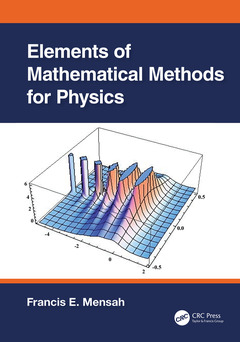Description
Elements of Mathematical Methods for Physics
Author: Mensah Francis E.
Language: English
Subject for Elements of Mathematical Methods for Physics:
· 17.8x25.4 cm · Hardback
Description
/li>Contents
/li>Readership
/li>Biography
/li>
?Elements of Mathematical Methods for Physics? provides students with an approachable and innovative introduction to key concepts of Mathematical Physics, accompanied by clear and concise explanations, relevant real-world examples, and problems that help them to master the fundamentals of Mathematical Physics. The topics are presented at a basic level, for students lacking a prior mathematical background.
This book is designed to be covered in two semesters, presenting eighteen chapters on topics varying from Differential Equations, Matrix Algebra, Tensor Analysis, to Fourier Transform, including Special Functions and Dynamical Systems.
Upper level undergraduate and graduate students of physics and engineering as well as professionals, will gain a better grip of the basics, a deeper insight and appreciation for mathematical methods for physics.
Key Features:
? Reviews and presents the basic math skills needed at the undergraduate level.
? Chapters accompanied by examples and end-of-chapter problems to enhance understanding.
? Introduces dynamical systems and includes a chapter on Hilbert Space.
Dr. Francis Mensah is currently Interim Chair of the Department of Natural Sciences and Associate Professor of Physics at Virginia Union University. He is also the Coordinator for the Physics and Engineering program. He holds a PhD in Atmospheric Lidar & Remote Sensing from Howard University and a D.Sc. in Theoretical Physics from the University of Abomey-Calavi in Benin. Dr. Mensah has been Lecturer in Physics and in Mathematics at Howard University in the Department of Physics & Astronomy and in the Department of Mathematics. He was also an Assistant Professor of Physics at the University of the District of Columbia in Washington DC. He is a member of the American Physical Society and the National Society of Black Physicists. In 2018, Dr Mensah received the Scott & Stringfellow Outstanding Professor Award from Virginia Union University. Dr Mensah?s passion is teaching which he loves from early age. He has used various techniques to teach including Project-Based Learning (PBL), a project currently sponsored by the National Science Foundation (NSF).
Chapter 1: Elements of Ordinary Differential Equations. Chapter 2: Elements of Partial Differential Equations. Chapter 3: Vector Analysis. Chapter 4: Matrix Algebra. Chapter 5: Tensor Analysis. Chapter 6: Differential Forms. Chapter 7: Infinite Sequences and Series. Chapter 8: Functions of a Complex Variable. Chapter 9: Fourier Series. Chapter 10: Fourier Transform. Chapter 11: Laplace Transform. Chapter 12: Special Functions. Chapter 13: Green's Function. Chapter 14: Integral Equations. Chapter 15: Introduction to Dynamical Systems. Chapter 16: Variational Methods. Chapter 17: Introduction to Banach and Hilbert's Spaces. Chapter 18: Probability and Statistics. Appendix A: Basic Laws of Electromagnetism. Appendix B: Introduction to Lebesgue Theory. Bibliography. Index.
Dr. Francis Mensah is currently Interim Chair of the Department of Natural Sciences and Associate Professor of Physics at Virginia Union University. He is also the Coordinator for the Physics and Engineering program. He holds a PhD in Atmospheric Lidar & Remote Sensing from Howard University and a D.Sc. in Theoretical Physics from the University of Abomey-Calavi in Benin. Dr. Mensah has been Lecturer in Physics and in Mathematics at Howard University in the Department of Physics & Astronomy and in the Department of Mathematics. He was also an Assistant Professor of Physics at the University of the District of Columbia in Washington DC. He is a member of the American Physical Society and the National Society of Black Physicists. In 2018, Dr Mensah received the Scott & Stringfellow Outstanding Professor Award from Virginia Union University. Dr Mensah’s passion is teaching which he loves from early age. He has used various techniques to teach including Project-Based Learning (PBL), a project currently sponsored by the National Science Foundation (NSF).




